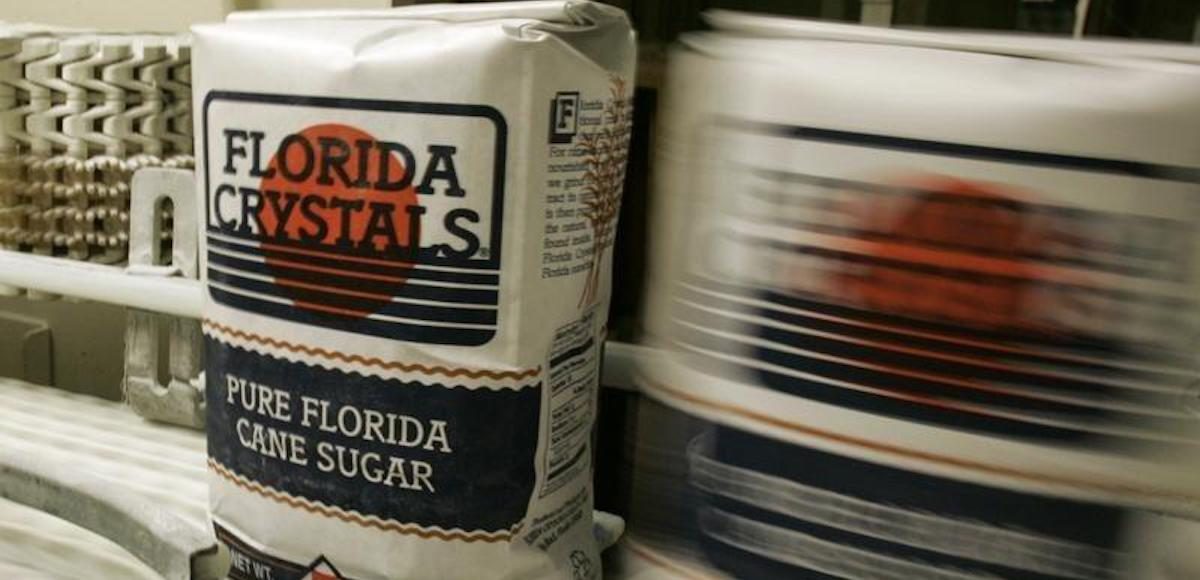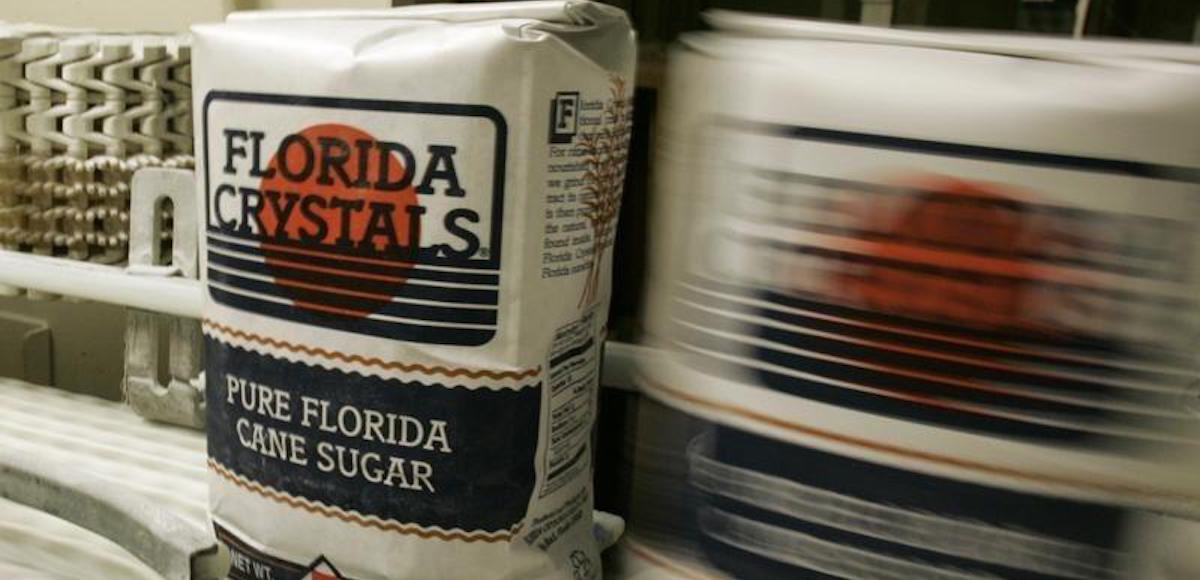

Bags of Florida Crystals cane sugar roll down a conveyer belt after filling at the Florida Crystals Corp. sugar mill, refinery and power plant in Okeelanta, Florida July 9, 2008. (Photo: Reuters)
Government intervention is not good for economic prosperity. That general observation is both accurate and appropriate, but it might also be helpful to contemplate what sector of the economy suffers the most damage and distortion because of government.
- In terms of aggregate impact, there’s a strong case to be made that government intervention – via spending, tax breaks, and price controls – wreaks the most havoc with the health sector.
- In terms of perverse results, it’s hard to imagine a more convoluted sector than higher education, where government intervention causes higher tuition and transfers wealth from the poor to the rich.
- In terms of all-encompassing, Soviet-style central planning, the plethora of handouts, subsidies, protectionism, and cronyism in the agriculture sector is hard to match.
Speaking of agriculture, let’s commemorate Valentine’s Day by exploring how politicians shower sugar producers with undeserved wealth every time one of us buys something sweet for a sweetheart.
Vincent Smith of the American Enterprise Institute shares some grim news on who is reaping unearned benefits.
Valentine’s Day is here again, and still the US sugar lobby has its hand in everyone’s wallet when they buy chocolate and other candy for their friends and families. For over four decades, the sugar lobby has managed to persuade Congress to maintain a Soviet-style supply control program that, by sharply limiting imports and curtailing domestic production, keeps US sugar prices well above free market levels. The program costs US consumers an average of about $3.4 billion every year, effectively a hidden annual tax of over $40 for a typical family of four, all to benefit fewer than 5,000 farm businesses. Further, the program raises production costs for the US food processing industry, damaging the food industry’s ability to compete in export markets and causing them to sacrifice a share of the domestic market to exporters from other countries. The impact of the US sugar program on employment for US citizens consistently has been estimated to be negative, costing the US economy between 10,000 and 20,000 jobs on a net basis. While the program creates employment for some workers in sugar refineries, it destroys far more employment opportunities in the US food processing sector by making the sector less competitive.
Two of his colleagues, John C. Beghin and Amani Elobeid, produced a detailed study on the topic for AEI. Here are the key findings.
The sugar program is a protectionist policy, which increases the domestic price of sugar above the corresponding world price. It restricts imports of raw and refined sugar, depresses world sugar prices, and substantially changes the mix of sweeteners used in processed food. Domestic markets are distorted, sugar users are effectively taxed by the program, and sugar producers are subsidized by it. The welfare transfer to sugar growers and processors is quite large in the aggregate, hovering around $1.2 billion. Losses to households are diffused, about $10 per person per year but large for the population as a whole, in the range of $2.4–$4 billion. …Gains to producers are concentrated in a few hands, especially in the cane sugar industry. Labor effects from lost activity in food industries are between 17,000 and 20,000 jobs annually.
For those who like the quantitative details, here’s a table with the most important numbers in the study.

Writing for the Federalist, Eric Peterson explains the high costs and inefficiency associated with this bit of central planning.
The history of candy canes dates back over 300 years… While this iconic symbol of Christmas saw its first mass production in America, Washington politicians have too often behaved like Scrooge, enacting policies that have sent all but one maker of this holiday classic fleeing abroad. One reason for the mass exodus is the little known U.S. sugar program. …Government interference in the sugar market comes in four flavors: Price supports, marketing allotments, import quotas, and the Feedstock Flexibility Program. …Although programs such as price supports (which mandate domestic prices for sugar at nearly double the world price) are fairly straightforward, programs such as Feedstock Flexibility are far more opaque. It allows sugar producers to sell sugar to the government at above market value, which the government then sells to ethanol producers at a loss. …Companies that need sugar for their products…can’t even import cheaper sugar from abroad thanks to import quotas that strictly limit foreign sugar. It’s no one wonder that some companies like Atkinson Candy Co have responded by moving some of their peppermint-candy production to Guatemala, where sugar is cheap and plentiful. …Consumers pay higher prices on everything from chocolate to cranberry sauce thanks to these big-government mandates, with the estimated annual costs to consumers and food manufacturers adding up to a whopping $3.5 billion annually. …Since 1997, for example, over 120,000 jobs have been lost in the sugar industry. It’s estimated for every job subsidies prop up, three are destroyed.
Notice, by the way, the consistent theme that subsidies and protectionism result in fewer jobs. This is not a surprising result for anybody who has looked at the fourth item in this column.
Let’s continue with some more analysis. The Foundation for Economic Education has a column by Ted Ellis on the program.
…for taxpayers, …sweetness doesn’t come cheap. For decades, domestic sugar producers have been protected from fair competition. In recent years, their influential lobby has ensured producers’ inflated profits through $260 million worth of federal subsidies and restrictions on fairly priced imported sugar. …these handouts rarely accrue to anyone but the industry’s largest and most well-connected players. …The National Confectioners’ Association, a trade group, agrees…that “the benefits of sugar subsidies and protections go directly to just 14 sugar beet and sugarcane producers in a few states.” …inflated prices disrupt domestic supply chains, threatening thousands of well-paying American manufacturing jobs, all while nibbling away at American taxpayers’ wallets. …the sugar program costs American businesses and consumers more than $3 billion every year. …the cost of special-interest lobbying in the sugar industry is felt most heavily by US workers laid off by companies that have been forced to move abroad, where sugar prices are cheaper. A 2006 report by the US International Trade Administration found that as many as 10,000 American jobs were lost as confectioners such as Hershey Co. and Lifesavers were forced by government-inflated domestic sugar prices to move plants out of the US. The same report found that the many jobs lost on account of federal intervention in sugar production far outweigh the few jobs saved for growers. In fact, it found that “for each one sugar growing and harvesting job saved through high US sugar prices, nearly three confectionery manufacturing jobs are lost.”
If you’re tired of reading about the senselessness of sugar subsidies, here’s a video on the topic from Reason. It has a Halloween theme instead of a Valentine’s Day theme, but that doesn’t change anything.
Let’s conclude with some hard-hitting analysis by Jim Bovard, who explains the tangled web of cronyism for CapX.
…the federal government has maintained an array of sugar import quotas and/or tariffs for most of the last 200 years. The regulatory regime has provided windfalls for generations of politicians and jobs for legions of bureaucrats while destroying more than a hundred thousand private, productive jobs. …The sugar program illustrates why politicians cannot be trusted to competently manage anything more complex than a lemonade stand. In 1816, Congress imposed high tariffs on sugar imports in part to prop up the value of slaves in Louisiana. In 1832, a committee of Boston’s leaders issued a pamphlet denouncing sugar tariffs as a scam on millions of low-paid American workers to benefit fewer than 500 plantation owners. …Despite perpetual aid, the number of sugar growers has declined by almost 50% in recent decades to fewer than 6,000. Federal policy failed to countervail the fact that the climate in the mainland U.S. is relatively poorly suited for sugarcane production. …Federal sugar policy costs consumers $3 billion a year and is America’s least efficient welfare program. In the 1980s, sugar import restrictions cost consumers $10 for each dollar of sugar growers’ income. …producing candy and many other food products is far more expensive here than abroad. Since 1997, sugar policy has zapped more than 120,000 jobs in food manufacturing… More than 10 jobs have been lost in manufacturing for every remaining sugar grower in the U.S. …The sugar lobby showers Congress with money, including almost $50 million in campaign contributions and lobbying between 2008 and 2013. In return, members of Congress license sugar growers to pilfer consumers at grocery checkouts and rob hardworking Americans of their jobs.
That last segment is the key. Sugar subsidies are a class case of “public choice,” with special interests and politicians both benefiting while ordinary people pay the price.
There are many reasons to shut down the Department of Agriculture. But it’s hard to imagine a bigger reason than getting rid of handouts for Big Sugar. Maybe ultra-corrupt ethanol handouts are even worse, but that’s a judgement call.





